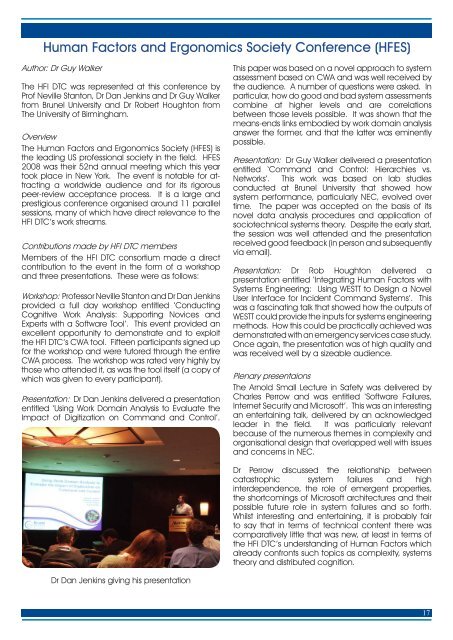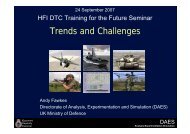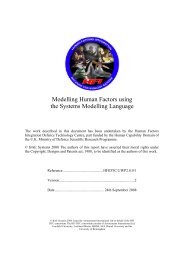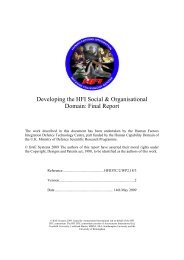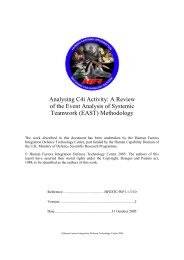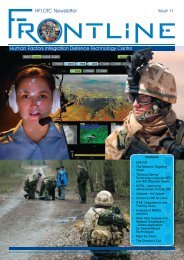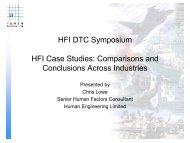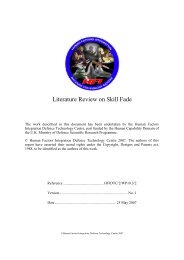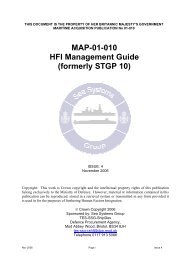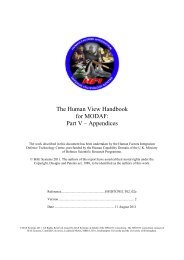Frontline Issue 09 - Human Factors Integration Defence Technology ...
Frontline Issue 09 - Human Factors Integration Defence Technology ...
Frontline Issue 09 - Human Factors Integration Defence Technology ...
You also want an ePaper? Increase the reach of your titles
YUMPU automatically turns print PDFs into web optimized ePapers that Google loves.
<strong>Human</strong> <strong>Factors</strong> and Ergonomics Society Conference (HFES)Author: Dr Guy WalkerThe HFI DTC was represented at this conference byProf Neville Stanton, Dr Dan Jenkins and Dr Guy Walkerfrom Brunel University and Dr Robert Houghton fromThe University of Birmingham.OverviewThe <strong>Human</strong> <strong>Factors</strong> and Ergonomics Society (HFES) isthe leading US professional society in the field. HFES2008 was their 52nd annual meeting which this yeartook place in New York. The event is notable for attractinga worldwide audience and for its rigorouspeer-review acceptance process. It is a large andprestigious conference organised around 11 parallelsessions, many of which have direct relevance to theHFI DTC’s work streams.Contributions made by HFI DTC membersMembers of the HFI DTC consortium made a directcontribution to the event in the form of a workshopand three presentations. These were as follows:Workshop: Professor Neville Stanton and Dr Dan Jenkinsprovided a full day workshop entitled ‘ConductingCognitive Work Analysis: Supporting Novices andExperts with a Software Tool’. This event provided anexcellent opportunity to demonstrate and to exploitthe HFI DTC’s CWA tool. Fifteen participants signed upfor the workshop and were tutored through the entireCWA process. The workshop was rated very highly bythose who attended it, as was the tool itself (a copy ofwhich was given to every participant).Presentation: Dr Dan Jenkins delivered a presentationentitled ‘Using Work Domain Analysis to Evaluate theImpact of Digitization on Command and Control’.This paper was based on a novel approach to systemassessment based on CWA and was well received bythe audience. A number of questions were asked. Inparticular, how do good and bad system assessmentscombine at higher levels and are correlationsbetween those levels possible. It was shown that themeans-ends links embodied by work domain analysisanswer the former, and that the latter was eminentlypossible.Presentation: Dr Guy Walker delivered a presentationentitled ‘Command and Control: Hierarchies vs.Networks’. This work was based on lab studiesconducted at Brunel University that showed howsystem performance, particularly NEC, evolved overtime. The paper was accepted on the basis of itsnovel data analysis procedures and application ofsociotechnical systems theory. Despite the early start,the session was well attended and the presentationreceived good feedback (in person and subsequentlyvia email).Presentation: Dr Rob Houghton delivered apresentation entitled ‘Integrating <strong>Human</strong> <strong>Factors</strong> withSystems Engineering: Using WESTT to Design a NovelUser Interface for Incident Command Systems’. Thiswas a fascinating talk that showed how the outputs ofWESTT could provide the inputs for systems engineeringmethods. How this could be practically achieved wasdemonstrated with an emergency services case study.Once again, the presentation was of high quality andwas received well by a sizeable audience.Plenary presentaionsThe Arnold Small Lecture in Safety was delivered byCharles Perrow and was entitled ‘Software Failures,Internet Security and Microsoft’. This was an interestingan entertaining talk, delivered by an acknowledgedleader in the field. It was particularly relevantbecause of the numerous themes in complexity andorganisational design that overlapped well with issuesand concerns in NEC.Dr Perrow discussed the relationship betweencatastrophic system failures and highinterdependence, the role of emergent properties,the shortcomings of Microsoft architectures and theirpossible future role in system failures and so forth.Whilst interesting and entertaining, it is probably fairto say that in terms of technical content there wascomparatively little that was new, at least in terms ofthe HFI DTC’s understanding of <strong>Human</strong> <strong>Factors</strong> whichalready confronts such topics as complexity, systemstheory and distributed cognition.Dr Dan Jenkins giving his presentation17


